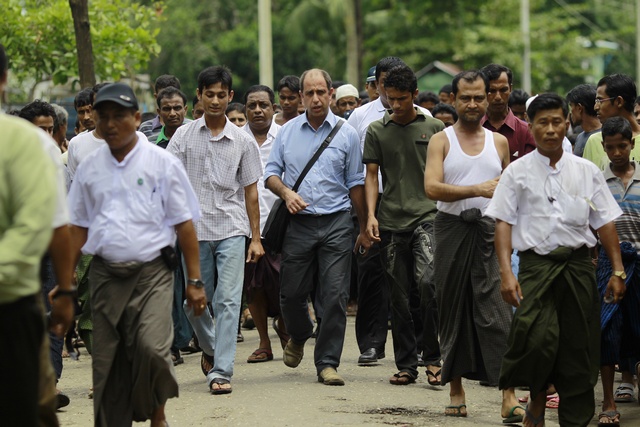The UN General Assembly’s human rights committee on Tuesday passed a resolution urging Burma to give the stateless Rohingya minority equal access to citizenship and to crack down on Buddhist violence against them and other Muslims in the Southeast Asian nation.
The resolution passed the committee by consensus, meaning under General Assembly rules the body will unanimously pass it later this year.
Burma emerged from a half-century of military rule in 2011, but its transition to democracy has been marred by sectarian violence that has left more than 240 people dead and sent another 140,000 fleeing their homes, most of them Rohingya. Some say the inter-communal violence presents a threat to Burma’s political reforms because it could encourage security forces to re-assert control.
In 1982, Burma passed a citizenship law recognizing eight races and 130 minority groups – but omitted the nation’s 800,000 Rohingya, among Burma’s 60 million people. Many Burmese Buddhists view the Rohingya as interlopers brought in by British colonialists from modern-day Bangladesh, but many Rohingya say they have lived in the country for hundreds of years.
[related]
Nobel Peace Prize laureate Aung San Suu Kyi, seen as likely to be elected as the next president of Burma, has had little else to say about Rohingya rights. She declined to meet with an Organisation of Islamic Cooperation delegation visiting Burma this week to look into the plight of the Rohingya.
Burma had been ostracised by most of the world for 50 years after a coup that instituted military rule. But in recent years the nation has been cautiously welcomed into the international community after it freed many political prisoners and ended the house arrest of Suu Kyi and instituted reforms. President Barack Obama visited the country last year on an Asian tour, as a hallmark of Burma’s rehabilitation.
The General Assembly resolution welcomed a statement by Burma’s president that “no prisoners of conscience will remain in prison by the end of the year.” Burma released 69 political prisoners last week.
But it also “expresses concern about remaining human rights violations, including arbitrary arrests and detentions of political activists and human rights defenders, forced displacement, land confiscations, rape and other forms of sexual violence and torture and cruel, inhuman and degrading treatment, as well as violations of international humanitarian law, and urges the government of Burma to step up its efforts to put an end to such violations.”
In the resolution, the Assembly reiterated its serious concern about communal violence and other abuses of the Rohingya minority in Arakan state in the past year, and about attacks against Muslim minorities elsewhere.
Burma’s government calls the Rohingya “Bengalis,” a reference to their reported South Asian roots. Rohingya leaders object to the terminology.
The Rohingya speak a Bengali dialect and resemble Bangladeshis, with darker skin than most people in Burma. Bangladesh also refuses to accept them as citizens.



